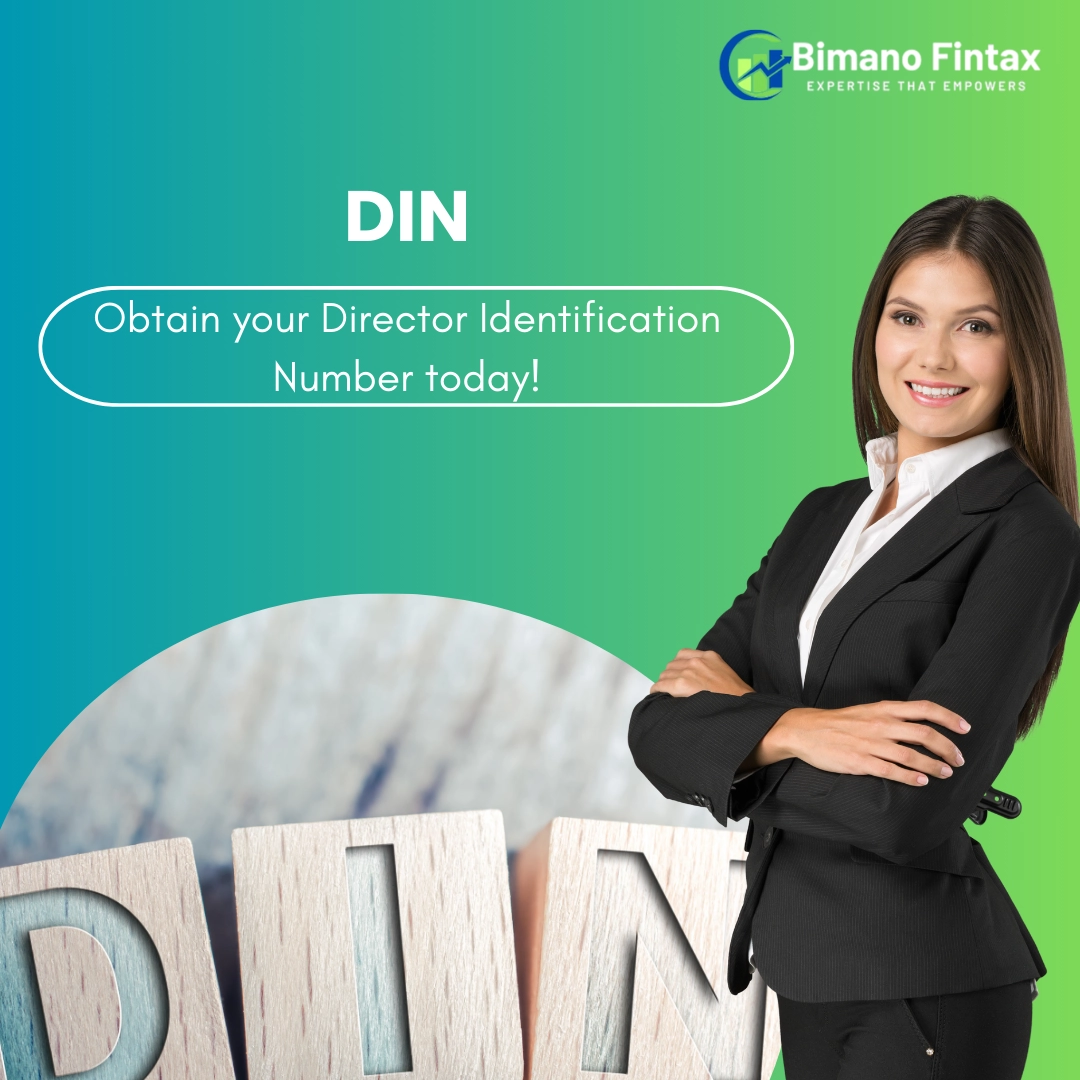Description
Introduction to Director Identification Number (DIN)
A Director Identification Number, commonly referred to as DIN, is a unique identifier assigned to an individual who is, or aspires to become, a director in a company. This unique number serves as a critical element in the landscape of corporate governance. The concept of DIN was introduced to establish a standardized method of identifying and tracking the involvement of individuals in various companies, thereby promoting transparency and accountability within the corporate sector.
Essentially, the DIN is akin to a personal identification number but specifically tailored for the corporate environment. It plays a vital role in ensuring compliance with corporate governance regulations, which are fundamental in maintaining the integrity and efficiency of corporate operations. The requirement for directors to possess a DIN was mandated to prevent instances of fraudulent practices and to streamline the process of managing corporate records.
The significance of having a DIN cannot be overstated. It is a mandatory requirement for all individuals who wish to hold the position of a director in any company, be it private or public. The absence of a DIN can lead to legal complications and disqualification from directorial roles. This unique identifier assists regulatory authorities in maintaining a comprehensive database of all directors, thus facilitating the monitoring and enforcement of corporate laws and standards.
Furthermore, the DIN serves as a tool for enhancing corporate transparency. It enables stakeholders, including investors, creditors, and regulatory bodies, to access accurate information about the directors of a company. This accessibility fosters trust and confidence in the corporate sector, thereby contributing to a more stable and reliable business environment. In summary, the Director Identification Number is a cornerstone of modern corporate governance, ensuring that individuals in directorial roles are easily identifiable and accountable for their actions within the corporate framework.
Importance of DIN for Directors
The Director Identification Number (DIN) holds significant importance for individuals serving as directors of companies. This unique identifier plays a crucial role in maintaining a comprehensive database of directors, which is essential for ensuring transparency and accountability in corporate governance. By providing a unique identity to each director, DIN helps regulatory authorities and stakeholders easily track and verify the credentials of individuals occupying these pivotal positions.
One of the primary advantages of DIN is its contribution to preventing fraudulent activities within the corporate sector. With a centralized database of directors, it becomes easier to identify and deter individuals with a history of unethical practices from holding directorial positions in multiple companies. This measure not only promotes ethical behavior but also enhances investor confidence and protects the interests of shareholders.
Moreover, DIN is a mandatory requirement under various legal frameworks, underscoring its importance in the realm of corporate governance. Directors are legally obliged to obtain and maintain their DIN, ensuring that their personal and professional details are transparent and accessible to regulatory bodies. Non-compliance with DIN regulations can lead to legal repercussions, including fines and disqualification from holding directorial positions.
In addition to its role in fraud prevention and legal compliance, the DIN system also facilitates better corporate governance by enabling systematic record-keeping and monitoring of directorial activities. This organized approach aids in the efficient management of corporate affairs and enhances the overall integrity of the business environment.
Overall, the DIN serves as a fundamental tool in the corporate world, safeguarding the interests of all stakeholders and promoting a culture of transparency and accountability. Its implementation underscores the importance of regulatory measures in fostering a robust and trustworthy corporate governance framework.
Eligibility Criteria for Obtaining a DIN
Understanding the eligibility criteria for obtaining a Director Identification Number (DIN) is fundamental for anyone aspiring to become a director of a company in India. The DIN is a unique identifier for individuals who wish to assume the role of a director within a corporation, and it ensures transparency and accountability in corporate governance. The criteria encompass a range of qualifications and restrictions designed to maintain the integrity of corporate leadership.
Firstly, any individual who intends to be appointed as a director of a company must apply for a DIN. This requirement is not limited to Indian nationals; foreign nationals can also apply, provided they intend to hold a directorship in an Indian company. There are no specific academic qualifications mandated by law for obtaining a DIN. However, the individual must be legally competent, which means they must be of sound mind and not declared bankrupt.
Additionally, certain disqualifications are strictly enforced. For instance, a person who has been declared insolvent or has been convicted by a court of any offense involving moral turpitude or otherwise, and sentenced to imprisonment for not less than six months, is disqualified from obtaining a DIN. Moreover, if an individual has been adjudged to be of unsound mind by a court of competent jurisdiction, they are also ineligible. The law further restricts individuals who have been disqualified by an order from the Tribunal or who have been absconding or involved in fraudulent activities.
Another critical requirement is the need for valid identification documents. Applicants must provide proof of identity and address, which can include a passport, voter ID, or Aadhaar card for Indian nationals, and a passport for foreign nationals. These documents need to be attested by a Notary Public or an equivalent authority.
In conclusion, while obtaining a DIN is a straightforward process, it is essential to meet the outlined eligibility criteria to ensure compliance with legal standards and uphold corporate governance principles. Aspiring directors must carefully review these requirements to facilitate a smooth application process and avoid potential disqualifications.
Step-by-Step Guide to Applying for a DIN
Applying for a Director Identification Number (DIN) is a crucial process for anyone aspiring to become a director in a company registered under the Companies Act of India. The process is streamlined through the eForm DIR-3 KYC. Below are detailed steps to guide you through the application process.
Preparation of Necessary Documents
Before initiating the application, ensure you have the following documents ready:
- Proof of Identity: PAN card for Indian nationals and passport for foreign nationals.
- Proof of Address: Voter ID, passport, driver’s license, or utility bills not older than two months.
- Photograph: A recent passport-sized photograph in JPEG format.
- Digital Signature Certificate (DSC): Ensure that it is registered on the MCA (Ministry of Corporate Affairs) portal.
Filling out the eForm DIR-3 KYC
Once the documents are in order, proceed to fill out the eForm DIR-3 KYC. Here is how:
1. Visit the MCA portal and download the eForm DIR-3 KYC.2. Fill in your personal details accurately, including name, father’s name, date of birth, and nationality.3. Provide your contact information, such as email address and mobile number. A One-Time Password (OTP) will be sent for verification.4. Upload the necessary documents as per the specified formats and sizes.5. Affix your Digital Signature Certificate.
Submitting the Application
Submit the eForm DIR-3 KYC through the MCA portal. Upon successful submission, you will receive an acknowledgment form. Keep this for future reference.
Common Mistakes to Avoid
While applying for a DIN, avoid these common mistakes:
- Incorrect or mismatched personal details, which can lead to application rejection.
- Failure to upload documents in the specified format and size.
- Neglecting to verify the email and mobile number via OTP.
- Using an expired or unregistered Digital Signature Certificate.
By following these steps meticulously and avoiding common errors, you can ensure a smooth and successful DIN application process.
Annual Compliance: eForm DIR-3 KYC
The Director Identification Number (DIN) is a vital aspect of corporate governance. To maintain its active status, directors must adhere to an annual compliance requirement by submitting eForm DIR-3 KYC. This form is crucial for ensuring the accuracy of director information and enhancing transparency within corporate structures.
eForm DIR-3 KYC must be submitted annually by all individuals who hold a DIN as of March 31st of a given year. The deadline for submission is generally set at September 30th of each year. Failing to meet this deadline can lead to significant repercussions, including the deactivation of the DIN. Without an active DIN, directors cannot legally partake in corporate responsibilities, effectively paralyzing their ability to fulfill directorial duties.
The importance of eForm DIR-3 KYC cannot be overstated. It serves to verify the identity of directors, thus preventing fraudulent activities and ensuring that only authentic individuals are allowed to hold directorial positions. This compliance measure contributes to the overall integrity and reliability of corporate governance.
The form itself requires several key pieces of information. Directors must provide their personal details, including their full name, father’s name, date of birth, and nationality. Additionally, contact information such as a mobile number and email address is mandatory. Directors are also required to submit proof of identity and address, which can include documents like a passport, voter ID card, or Aadhaar card.
Non-compliance with the eForm DIR-3 KYC requirement can result in penalties and the disqualification of directors from their roles. Therefore, it is imperative for directors to ensure timely submission and accurate information in the form. Regular adherence to this annual compliance not only keeps the DIN active but also upholds the credibility and operational efficiency of the corporate entity.
Common Challenges in Obtaining and Maintaining a DIN
Acquiring and maintaining a Director Identification Number (DIN) can present several challenges for individuals, often leading to delays and complications. One of the primary hurdles is dealing with application rejections. Rejections typically occur due to incomplete or incorrect information submitted during the application process. To mitigate this, it is essential to thoroughly review all documentation before submission, ensuring that all required fields are accurately filled out and supported by the necessary proof.
Another prevalent issue is the need for updating personal or professional information associated with the DIN. Changes such as a new address, name, or contact details must be promptly updated in the DIN records to avoid discrepancies. This can be efficiently managed by regularly reviewing and updating the information through the appropriate government portals, ensuring that all details are current and accurate.
Discrepancies in the information provided can also pose significant challenges. These discrepancies might arise from typographical errors, outdated information, or inconsistencies across different documents. To handle such issues, it is advisable to cross-check all the details provided during the application and update processes. If discrepancies are discovered, prompt action should be taken to rectify them by submitting the correct information along with any necessary supporting documents.
In addition, applicants may face challenges related to the technical aspects of the online application system, such as website downtime or system errors. To address these issues, it is recommended to apply during off-peak hours and ensure a stable internet connection. Keeping a backup of all submitted documents can also safeguard against potential data loss during technical glitches.
Overall, while obtaining and maintaining a DIN can present several challenges, these can be effectively managed by ensuring accuracy, timeliness, and vigilance in the application and maintenance processes. By being proactive and attentive to detail, individuals can navigate these challenges successfully and maintain their DIN without significant difficulties.
How Bimano Fintax Can Help
Obtaining a Director Identification Number (DIN) can often be a daunting and complex process. Bimano Fintax, a leading consultancy firm, offers specialized services to streamline this procedure, ensuring that every step is handled with the utmost professionalism and efficiency. Their team of experts is well-versed in the intricacies of DIN application, providing clients with a seamless and stress-free experience.
Bimano Fintax begins by conducting a thorough assessment of an individual’s eligibility for a DIN. This initial consultation helps in identifying any potential issues that may arise during the application process. The firm’s professionals then assist in gathering all necessary documentation, ensuring that each form is accurately completed and submitted in a timely manner. This meticulous attention to detail significantly reduces the likelihood of delays or rejections.
Beyond the initial application, Bimano Fintax offers ongoing support to ensure compliance with annual requirements. Their services include monitoring deadlines for DIN renewals and keeping clients informed about any regulatory changes that may impact their status as directors. This proactive approach helps directors avoid penalties and maintain good standing with regulatory authorities.
The benefits of engaging Bimano Fintax for DIN-related services extend beyond mere convenience. By leveraging their expertise, clients can save valuable time and resources, allowing them to focus on their core business activities. Additionally, the firm’s deep understanding of the regulatory landscape ensures that clients remain compliant with all relevant laws and regulations, thereby mitigating the risk of legal issues.
In essence, Bimano Fintax’s comprehensive suite of services provides a reliable and efficient solution for obtaining and maintaining a Director Identification Number. Their commitment to client satisfaction and regulatory compliance makes them an invaluable partner for anyone navigating the complexities of corporate governance.
Conclusion: The Significance of DIN in Corporate Management
The Director Identification Number (DIN) holds paramount importance in the realm of corporate management and governance. As discussed throughout this comprehensive guide, the DIN serves as a unique identifier for directors, ensuring transparency and accountability within corporate entities. Its role in maintaining the integrity of corporate records cannot be understated, as it helps in tracking the activities and responsibilities of directors across various companies.
A properly managed DIN system facilitates efficient regulatory oversight, preventing fraudulent activities and aiding in the enforcement of compliance standards. By mandating DIN, regulatory bodies can swiftly verify the identities of directors, scrutinize their directorial history, and ensure they adhere to the legal frameworks governing corporate entities. This not only enhances the trust of stakeholders but also promotes a culture of ethical corporate governance.
For businesses, the DIN simplifies administrative processes by providing a consistent means of identifying directors in all official documentation and filings. This uniformity is crucial for maintaining accurate and up-to-date corporate records, which are essential for audits, legal proceedings, and strategic decision-making.
Given the critical role that the DIN plays, it is essential for companies and their directors to ensure timely application, renewal, and compliance with all regulatory requirements associated with the DIN. Navigating the complexities of DIN application and compliance can be challenging, which is why seeking professional assistance is highly recommended.
Bimano Fintax stands out as a reliable partner in this regard, offering expert guidance and support to streamline the DIN application and compliance process. Their experienced professionals are well-versed in the nuances of DIN regulations, ensuring that clients can focus on their core business activities while remaining compliant with all statutory requirements.
In conclusion, the DIN is a fundamental component of corporate governance, fostering transparency, accountability, and integrity within the corporate ecosystem. Leveraging professional services like those offered by Bimano Fintax can significantly ease the burden of DIN-related obligations, allowing directors and companies to operate more efficiently and confidently.






Reviews
There are no reviews yet.